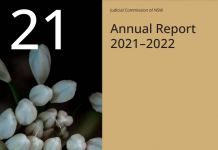Section 7 — Women
This update includes material on the impact of COVID-19 on women’s employment trends, leadership, wages, superannuation and unpaid work; the caring and domestic work of women, and violence against women.
At 7.2.1.1 — Gender pay gap in wages and superannuation, has been updated to note that during the period of COVID-19 lockdowns and recovery, the Federal Government’s recovery package was directed to personal income tax cuts, investment tax breaks and a big spend on infrastructure, with more direct support flowing to the male-dominated construction and energy sectors. It has also been noted under Wages that the NSW Government now publish a Gender Equality Dashboard, which provides an accessible, timely source of data showing progress in key indicators of women’s social and economic outcomes (currently economic opportunity and advancement; health and wellbeing; and participation and empowerment. Under Superannuation, it is noted under the Federal Government’s early release scheme during the height of the pandemic, one in seven women were withdrawing a larger proportion of their superannuation to pay bills. This means that the gender superannuation gap is set to get even bigger for female workers who accessed the Government’s COVID early release super scheme.
At 7.2.1.3— Occupational segregation and workplace discrimination, a new section on Electoral representation has been added, noting the under-representation of women in Parliament.
The impact of COVID-19 on women’s unpaid workload is discussed at 7.2.1.4— Caring, domestic work and the mental load and at 7.5.1 — Violence against women there is a discussion regarding differing reports about the impact of social restrictions on domestic violence rates.
The case of Vitality Works Australia Pty Ltd v Yelda (No 2) (2021) 105 NSWLR 403 has been added at 7.3 — Sexual harassment.
At 7.5.4 — Technology-facilitated abuse, it is noted rectification orders are now available under s 91S of the Crimes Act 1900 in relation to image-based abuse. Where a court finds a person guilty of an offence of recording or distributing an intimate image without consent under ss 91P and 91Q of that Act, the court can make a rectification order requiring the person to take reasonable actions to remove, retract, recover, delete or destroy any intimate image recorded or distributed by the person. In addition, new commentary on Technology-facilitated domestic violence has been added to this section
A discussion of the Consent law reforms in 2022 has been added at 7.5.6 — Sexual assault, including new s 61HJ(1)(a) of the Crimes Act 1900 which has been introduced to address the “freeze” response where a person does not physically or verbally resist an assault.
The “manosphere” is an umbrella term referring to a number of interconnected misogynistic communities online. It encompasses multiple types and degrees of misogyny — from broader male supremacist discourse to men’s rights activism and “involuntary celibates” (incels). A new section has been added at 7.5.7 — Incels and manosphere-related violence.
Section 9 — Gender diverse people and people born with diverse sex characteristics
Section 9 has been revised and updated to include reference at 9.1.1 Explanations and terminology — gender, transgender, transexual and non-binary people to update terminology such as gender identity and non-binary. In particular, the Modes of address at 9.6.1 has been updated to advise of a gender neutral title, which can be used as an alternative to the gendered honorifics Miss, Mrs, Ms, Mr. Mt/Mm, Mx (pronounced as “mix”) and which may be used for people who don’t fit the gender binary and therefore don’t feel that a gendered title fits their identity.










